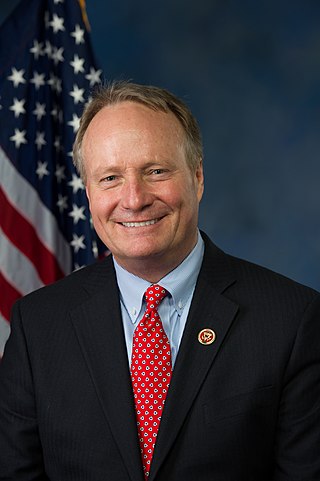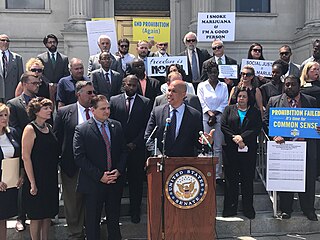Related Research Articles

Walter Beaman Jones Jr. was an American politician who served twelve terms in the United States House of Representatives as a member of the Republican Party for North Carolina's 3rd congressional district from 1995 until his death in 2019. The district encompassed the coastal regions of North Carolina, from the Outer Banks and areas near the Pamlico Sound in the north, southwards to the northern suburbs of Wilmington. Jones's father was Walter B. Jones Sr., a Democratic Party congressman from the neighboring 1st district. Prior to his election to the U.S. House of Representatives, he served ten years in the North Carolina House of Representatives as a member of the Democratic Party and worked as a business executive.

In the United States, the removal of cannabis from Schedule I of the Controlled Substances Act, the category reserved for drugs that have "no currently accepted medical use", is a proposed legal and administrative change in cannabis-related law at the federal level. After being proposed repeatedly since 1972, the U.S. Department of Justice initiated 2024 rulemaking to reschedule cannabis to Schedule III of the Controlled Substances Act. The majority of 2024 public comments supported descheduling, decriminalizing, or legalizing marijuana at the federal level.

In the United States, the non-medical use of cannabis is legalized in 24 states and decriminalized in 7 states, as of November 2023. Decriminalization refers to a policy of reduced penalties for cannabis offenses, typically involving a civil penalty for possessing small amounts, instead of criminal prosecution or the threat of arrest. In jurisdictions without penalty the policy is referred to as legalization, although the term decriminalization is sometimes used for this purpose as well.

In the United States, increased restrictions and labeling of cannabis as a poison began in many states from 1906 onward, and outright prohibitions began in the 1920s. By the mid-1930s cannabis was regulated as a drug in every state, including 35 states that adopted the Uniform State Narcotic Drug Act. The first national regulation was the Marihuana Tax Act of 1937.

In the United States, the use of cannabis for medical purposes is legal in 38 states, four out of five permanently inhabited U.S. territories, and the District of Columbia, as of March 2023. Ten other states have more restrictive laws limiting THC content, for the purpose of allowing access to products that are rich in cannabidiol (CBD), a non-psychoactive component of cannabis. There is significant variation in medical cannabis laws from state to state, including how it is produced and distributed, how it can be consumed, and what medical conditions it can be used for.

Tulsi Gabbard is an American politician, United States Army Reserve officer, and political commentator who was the U.S. representative for Hawaii's 2nd congressional district from 2013 to 2021. Gabbard was the first Samoan-American to become a voting member of Congress. She was a candidate for the Democratic nomination in the 2020 United States presidential election, before announcing in October 2022 that she had left the Democratic Party to become an independent.

Justin A. Amash is an American lawyer and politician who served as the U.S. representative for Michigan's 3rd congressional district from 2011 to 2021. He was the second Palestinian American and Syrian American member of Congress. Originally a Republican, Amash became an independent in 2019. He joined the Libertarian Party the following year, leaving Congress in January 2021 as the only Libertarian to serve in Congress. Amash returned to the Republican Party in 2024.

David Patrick Joyce is an American politician and attorney currently serving in the United States House of Representatives for Ohio's 14th congressional district since 2013. A member of the Republican Party, Joyce was previously the prosecutor of Geauga County, Ohio. He chairs the Republican Governance Group.

The Ending Federal Marijuana Prohibition Act is a series of federal marijuana decriminalization bills that have been introduced multiple times in the United States Congress.

In Washington, D.C., cannabis is legal for both medical use and recreational use for possession, personal use, cultivation, transportation and gifting, and for retail sale once a regulatory system is implemented following an affirmative vote by the residents on a 2014 ballot initiative. The United States Congress exercises oversight over the government of the District of Columbia, preventing the local government from regulating cannabis sales like other jurisdictions with authority derived from a U.S. state.

The Congressional Cannabis Caucus is a registered caucus in the United States Congress, formed in 2017 during the 115th session. The bipartisan caucus was founded by Republicans Dana Rohrabacher and Don Young and Democrats Earl Blumenauer and Jared Polis. The Congressional Cannabis Caucus seeks to harmonize federal laws that conflict with various state laws that permit medical and recreational cannabis.

The Stop Arming Terrorists Act is a proposed Act of Congress that was originally sponsored by United States Representative for Hawaii's 2nd congressional district Tulsi Gabbard and United States Senator for Kentucky Rand Paul in early 2017 to prohibit the use of United States Government funds to provide assistance to Al Qaeda, Jabhat Fateh al-Sham, and the Islamic State of Iraq and the Levant (ISIL) and to countries supporting those organizations, and for other purposes.
The Strengthening the Tenth Amendment Through Entrusting States (STATES) Act was a bill proposed in the 115th United States Congress that would recognize legalization of cannabis and the U.S. state laws that have legalized it through their legislatures or citizen initiative. It was introduced on June 7, 2018, by Senators Cory Gardner and Elizabeth Warren. A companion bill was introduced the same day in the House of Representatives, sponsored by Earl Blumenauer and David Joyce. The act would amend the Controlled Substances Act of 1970 to exempt from federal enforcement individuals or corporations in states who are in compliance with U.S. state, U.S. territory and the District of Columbia, or tribal law on cannabis, with certain additional provisions such as minimum ages. The banking provisions of the STATES Act have been reintroduced as the Secure and Fair Enforcement (SAFE) Banking Act of 2019 in the 116th U.S. Congress by Ed Perlmutter in the House, and by Jeff Merkley in the Senate. As of September 18, 2019, the House bill had 206 cosponsors, and the Senate bill had 33 cosponsors.
This page describes the stances held by Democratic candidates in the 2020 United States presidential election on a variety of policy issues. Only candidates still in the race during the 2020 Iowa caucuses are included.
During Tulsi Gabbard's tenure as a congresswoman and presidential candidate, she placed much emphasis on her foreign policy views and regarded them as inseparable from her domestic policy views. She criticizes what she terms the "neoliberal/neoconservative war machine", which pushes for US involvement in "wasteful foreign wars". She has said that the money spent on war should be redirected to serve health care, infrastructure, and other domestic priorities. Nevertheless, she describes herself as both a hawk and a dove: "When it comes to the war against terrorists, I'm a hawk", but "when it comes to counterproductive wars of regime change, I'm a dove".

The Marijuana Opportunity Reinvestment and Expungement Act, also known as the MORE Act, is a proposed piece of U.S. federal legislation that would deschedule cannabis from the Controlled Substances Act and enact various criminal and social justice reforms related to cannabis, including the expungement of prior convictions.

The Marijuana Justice Act (S.1689) was a 2017 bill to remove cannabis from the Controlled Substances Act, sponsored by U.S. Senator Cory Booker. An identical bill, H.R.4815, was introduced in the House of Representatives. The bill was reintroduced in 2019 and co-sponsored by a number of contenders for the Democratic Party's nomination for U.S. President in the 2020 election, including Kamala Harris, Elizabeth Warren, Kirsten Gillibrand, Michael Bennet, and Bernie Sanders. In February 2019, it was referred to the Committee on the Judiciary. The bill introduced by Senator Booker in the 2017–2018 Congress was called "among the most notable efforts" around legalization in that session. Besides removing cannabis from the Controlled Substances Act, the bill also sought to set up a community reinvestment fund, provide for expungement of past drug convictions, and penalize states that enforce cannabis laws disproportionately.

The Cannabis Administration and Opportunity Act is a proposed bill in the United States Congress to recognize legalization of cannabis by the states. The authors are Senate Majority Leader Chuck Schumer, Senator Cory Booker, and Senator Ron Wyden.
References
- 1 2 Alicia Wallace (March 3, 2017), "Guide to federal marijuana bills, Congressional Cannabis Caucus", The Cannabist , The Denver Post
- ↑ Lisa Rough (March 3, 2017), Virginia Republican Intros Legalization Bill. Who Is This Guy?, Leafly
- ↑ Congresswoman Tulsi Gabbard calls for marijuana decriminalization, Honolulu: KITV News, March 22, 2017, archived from the original on March 24, 2017, retrieved July 14, 2017
- ↑ Amash Co-Sponsors "Ending Federal Marijuana Prohibition Act of 2017" (official blog), Denver: Hoban Law Group, March 2017, archived from the original on 2017-04-25, retrieved 2017-04-24
- ↑ Steven Nelson (April 19, 2017), "Happy 4/20, Congress: Activists Have 1,227 Joints to Share", U.S. News & World Report
- ↑ Brooke Singman (April 20, 2017), 4/20 celebration leads to 7 arrests by US Capitol Police, Fox News